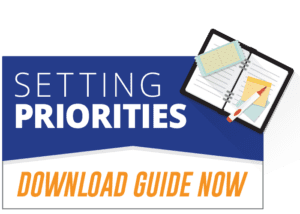One of the powerful secrets of effective leaders is establishing daily rituals or success routines. These leaders identify a few key behaviors that are important to them, and then they Hardwire, or put process and discipline around the behaviors, so they turn their intentions into action. We’ve asked a few of our David Novak Leadership Podcast guests what daily routines they follow to ensure they have the best day possible. Here are a few tips from some very successful leaders.
Prepare the Night Before
For David Novak Leadership founder David Novak, his daily routine actually starts the night before. Before he goes to bed, he looks at his calendar for the next day and asks himself, “What’s going to make each one of those meetings successful?” Then he tries to envision what a successful meeting would look like. By thinking about it the night before, David can go into each meeting prepared and focused on coming out with successful outcomes. Watch Here
 Cultivate A Positive Attitude
Cultivate A Positive Attitude
Harry Arnett, SVP Marketing of Callaway Golf, understands that deciding in advance to have a good day matters. So, each morning before he leaves for the day, Harry tells his wife and kids the same thing: “Let’s go make sure we have a better day today than we did yesterday, and let’s make a positive influence on at least some person today.”
Ken Langone, Co-Founder of The Home Depot, asks himself, “What can I do today to be as good a person as I hope I can be.” By asking and answering this question, Ken is preparing himself to look for ways to be the good person he wants to be, rather than hoping it will happen by chance. Watch Here
Physical Exercise
Brian Cornell, Chairman and CEO of Target Corporation recognizes the importance of exercise, so he is creative about building it into his schedule each day. Whether its 20 minutes in-between meetings or 20 minutes at the end of the day before a dinner function, he gets on the treadmill, which helps him manage his stress and refreshes his energy. Listen Here
Schedule Management
When David Novak realized that people tried to avoid him until around 10:00 in the morning because he is not a morning person, he learned not to schedule any major meeting till after 10:00 AM. This allows him to be at his best.
Connect with Others
Micky Pant, Chairman of Yum! China, makes it a habit to walk throughout the office talking to employees, which ensures that he is available and visible to his team.
Follow Up with Others
Jamie Dimon, JP Morgan Chase Chairman and CEO, is disciplined about follow-up. One way he keeps track of his tasks is by keeping an 8×10 handwritten list with him at all times. He lists the emails and phone calls he needs to return, he keeps track of who owes things to him so he can follow-up, and he lists things he needs to think about and will reflect on this while he’s driving. When an item is completed, he obliterates it off the list with joy. Watch Here
These success routines have worked well for these leaders. Which ones will help you become the best leader you can be? Think about what behaviors you might put into place to ensure you have the best day possible, then put them into practice and make them part of your daily routine.
If you haven’t received your free subscription to David Novak Leadership click here to subscribe and gain access to all of our free learning guides, blogs, and podcast clips. If you are already a subscriber you will be automatically redirected to all of these resources.










